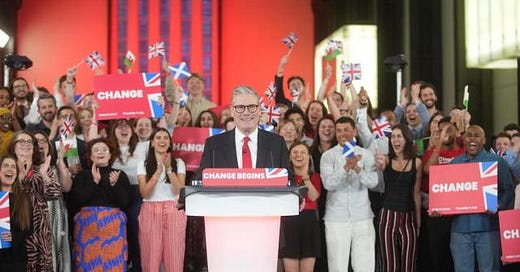As expected, Keir Starmer will be the next Prime Minister of England, Wales and Scotland for the next five years after winning a huge landslide in the election by surpassing the 326 seats required for a majority in the House of Commons; this puts an end to the 14 years of Tory rule. In his first speech, Starmer declared: "We did it, you campaigned for it, you fought for it, you voted for it and now it has arrived, change begins now.” Rishi Sunak conceded defeat moments before the number was reached: "The Labour Party has won this general election and I have called Sir Keir Starmer to congratulate him on his victory.” He later said "His (Starmer’s) successes will be all our successes, and I wish him and his family well. Whatever our disagreements in this campaign, he is a decent public spirited man who I respect." He has also resigned as leader of the Conservative Party.
Labour won 412 seats, booting some high-profile Conservative figures out of their seats and keeping many seats they have already won. Starmer has been busy on his first day in Number 10 appointing his new cabinet: Angela Rayner has been made deputy prime minister, Rachel Reeves has become the first female chancellor and David Lamy is the new foreign secretary, with Yvette Cooper as home secretary.
On the other hand, the Conservatives won just 121 seats, losing 250 seats over the night; just to add salt to their wound, the party has also lost some big candidates, including Lizz Truss (South West Norfolk), Grant Shapps, the former defence secretary (Welwyn Hatfield), Penny Mordaunt (Portsmouth North), who has been tipped to be the next leader of the party, Jacob Rees-Mogg (North East Somerset and Hanham) and Gillian Keegan (Chichester), the Education Secretary, after they were unable to keep their seats and were beaten by Labour candidates; however, Suella Braverman was able to kept her seat in Fareham and Waterlooville after winning 36,459 seats and so did Jeremy Hunt.
The Liberal Democrats won 71 seats, gaining 63. They took the constituencies of two of the four former Conservative prime ministers from the last 14 years - Lord Cameron in Witney and Lady May in Maidenhead. Other gains from the Tories include Wells and Mendip Hills, Dorking and Horley, Wimbledon, Yeovil, Hampshire Northeast and Norfolk North; they also unseated multiple Tory cabinet ministers, including Gillian Keegan. Ed Davy’s plan was to target the blue wall of Conservative seats in the Southwest and Southeast of England, and it appears they have done that. Davy stated after the result: "I hope that the style we've gone about has encouraged people to join the Liberal Democrats…It's certainly encouraged them to vote for us. This is an exceptional result, a historic result for the Liberal Democrats."
The SNP won nine seats, which is a damaging loss of 38 seats as yellow turned to red on the map of Scotland, which is their worst result since 2010. Labour made dramatic gains across the central belt, with most of their results following vote share swings of about 20% from the SNP. The Scottish Conservatives won five seats, down from six in 2019, with leader Douglas Ross failing to secure a controversial bid for Aberdeenshire North and Moray East. John Swinney has described the result as ‘very, very difficult and damaging’ and that he has to ‘accept we failed’.
Reform UK (formerly UKiP), who came second in 98 seats, won five seats, despite earning a total of 4 million votes, which is 500,000 more than The Liberal Democrats, yet they have won far fewer than them. Nonetheless, for a new party this result will be very positive, and it will see at least Richard Tice, Nigel Farage, Lee Anderson, Rupert Lowe and James McMurdock back in Parliament, after they all won in their constituencies. The party was hoping to win 13 seats, but they will settle with what they earned, especially after sharing 14% of the votes. After Farage's victory, here is what he said in his speech: “We are coming for Labour … be in no doubt about that. They are literally a broad church that has no shared religion.”.
The Green Party have also won four seats and have had their most successful election night. Up until now, the party had only ever won in the East Sussex constituency of Brighton Pavilion; in the election, the Green Party was able to hold that seat, whilst also securing wins in Bristol Central, Waveney Valley and North Herefordshire. Party co-leader Carla Denyer defeated Labour’s shadow culture secretary Thangam Debbonaire by a 10,000 majority and her co-leader Adrian Ramsay overturned a 22,000 Conservative majority to win Waveney Valley. The party won 7% of the votes.
After six weeks of campaigning, the race is finally over and the results are locked; we will have five years of a Labour government, who promise to bring change to the country and will ensure they put ‘country before party’. I am glad that the Conservatives are out and that Reform gained some seats, but I am ambivalent with how Labour are going to do and I believe that they only got in due to the hatred of the Conservative Party, who have done the antithesis of what their supporters want, but I could be wrong and they could turn out to be the right option. Let’s see how this goes.





Nice summary Jack!